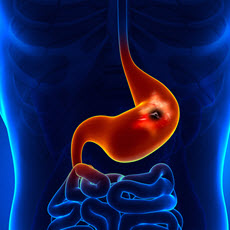
A peptic ulcer is a sore in the lining of your stomach or your duodenum, the first part of your small intestine. A burning stomach pain is the most common symptom. The pain:
- Starts between meals or during the night
- Briefly stops if you eat or take antacids
- Lasts for minutes to hours
- Comes and goes for several days or weeks
Peptic ulcers happen when the acids that help you digest food damage the walls of the stomach or duodenum. The most common cause is infection with a bacterium called Helicobacter pylori. Another cause is the long-term use of nonsteroidal anti-inflammatory medicines (NSAIDs) such as aspirin and ibuprofen. Stress and spicy foods do not cause ulcers, but can make them worse.
- Peptic Ulcer (National Library of Medicine)A peptic ulcer is a sore in the lining of your stomach or your duodenum, the first part of your small intestine. A burning stomach pain is the most common ...
- ... screen. This method is a means of diagnosing stomach ulcers as well as other anomalies along the upper ...
- Treatment for Peptic Ulcers (Stomach Ulcers)
 (National Institute of Diabetes and Digestive and Kidney Diseases) Peptic ulcer treatment, stomach ulcer treatment, duodenal ulcer treatment, proton pump inhibitor, PPI, H2 blocker, Helicobacter pylori treatment, H. pylori treatment, antibiotics, nonsteroidal anti- ...
(National Institute of Diabetes and Digestive and Kidney Diseases) Peptic ulcer treatment, stomach ulcer treatment, duodenal ulcer treatment, proton pump inhibitor, PPI, H2 blocker, Helicobacter pylori treatment, H. pylori treatment, antibiotics, nonsteroidal anti- ... - Peptic Ulcer/Clinical Trials ... Peptic Ulcer
- ... rare occasions, an ulcer may completely erode the stomach wall. The bacteria Helicobacter pylori is a major cause of ulcers. Treatment typically includes medications to suppress the stomach ...
- ... of peptic ulcers: Gastric ulcer -- occurs in the stomach Duodenal ulcer -- occurs in the first part of the small ... stomach to produce too much acid, leading to stomach and duodenal ulcers.
- ... or raw area in the lining of the stomach (gastric ulcer) or upper part of the small intestine (duodenal ... You have peptic ulcer disease (PUD). You may have had tests to help diagnose your ulcer. One of these tests may have ...
- ... combination with other medications to treat and prevent stomach ulcers caused by a certain type of bacteria (H. pylori) in adults. Nonprescription (over-the-counter) lansoprazole is used ... inhibitors. It works by decreasing the amount of acid made in the stomach.
- Diagnosis of Peptic Ulcers (Stomach or Duodenal Ulcers)
 (National Institute of Diabetes and Digestive and Kidney Diseases) Peptic ulcer diagnosis, stomach ulcer diagnosis, duodenal ulcer diagnosis, Helicobacter pylori, H. pylori, nonsteroidal anti-inflammatory drugs, NSAIDs, blood test, stool test, urea breath ...
(National Institute of Diabetes and Digestive and Kidney Diseases) Peptic ulcer diagnosis, stomach ulcer diagnosis, duodenal ulcer diagnosis, Helicobacter pylori, H. pylori, nonsteroidal anti-inflammatory drugs, NSAIDs, blood test, stool test, urea breath ... - Definition & Facts for Peptic Ulcers (Stomach or Duodenal Ulcers)
 (National Institute of Diabetes and Digestive and Kidney Diseases) Peptic ulcer, stomach ulcer, duodenal ulcer, peptic ulcer disease, stomach, duodenum, nonsteroidal anti-inflammatory drugs, NSAIDs, Helicobacter pylori, H. pylori, bleeding, perforation, ...
(National Institute of Diabetes and Digestive and Kidney Diseases) Peptic ulcer, stomach ulcer, duodenal ulcer, peptic ulcer disease, stomach, duodenum, nonsteroidal anti-inflammatory drugs, NSAIDs, Helicobacter pylori, H. pylori, bleeding, perforation, ...



